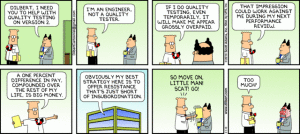We like to believe it or not, nowadays, organizations are political structures. The bigger the organization, the more political skills you need in order to survive in it. Most leaders have in their soft skills kit the charisma of a politician and they might have been promoted in part because they were good at this game.
“Politics” is older than the term that defines it. There is this theory that humans invented speech because they needed to gossip. We are still doing it these days but we tend to give it a bad image. Back then it wasn’t about how polite or not you are if you gossip; back then it was about surviving. You needed gossip to find out who are the persons who are helpful or who are those who fooled others in the past, who are the skilled or the lazy hunters/gatherers, who is the son/brother/relative of whom. Basically, you needed gossip to find out whom you can trust.
I am now working with six people who train to become a professional improv group. After a couple of rehearsals I realized that the mantra they need is “take care of the others”. If every time you step on the stage with that in mind, as an improviser, everything else follows: you need to be present to see what the others are doing, you need to listen to them, you need to say yes and accept their ideas so that they don’t look like they have bad ideas, you need to help them work that idea out, to make it interesting and so on. So instead of making them remember all those “improv rules” I stress a lot about “make the others look good, take care of them”. They’ll figure out how on the way.
Why is it hard to make “take care of the others” work? Because you need a lot of trust. You need to trust that if you will take care of the others, they will take care of you in return, so you are safe not to focus on making yourself look good – it’s surviving all over again, but in the contemporary society.
To go full circle lets return to the organizations. In business, unless it’s a brainstorming, maybe it’s more complicated to say yes to any idea, to try to make any idea work. There might be some bad ideas that don’t deserve nor the investment nor the struggle. But if you focus on making people take care of each other, if you can make the team members trust each other, then even rejecting an idea can be turned into a constructive feedback and a lesson to be learned.
The result? People will focus more on actually helping the company thrive and not on political schemes (what should I say and what should I keep for myself, whom to say what, how to make my idea look better than the others, how to obtain a good peer review and so on).
Fighting politics is never easy and implementing such a change into an organization is a long-term process. Especially because “trust” is not something you can learn from someone, is something you must build.
But in the context of the hot topic of employee engagement, I think we should start to think about such a process more serious. Politics can be toxic for a team. Plus, you never know when the next financial or other type of crisis will hit. You should be prepared with a strong team to surpass it…like an improv group which is prepared for anything they’re challenged to face on stage on every performance.



Leave a Reply